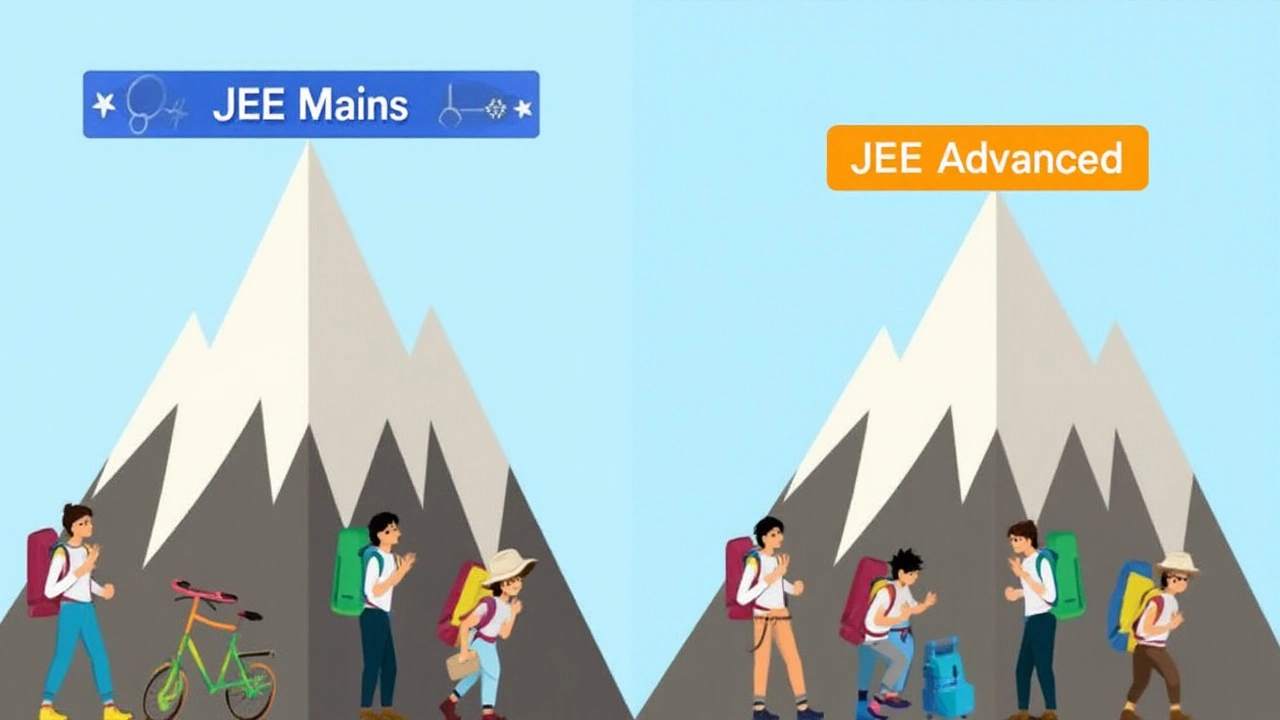The IIT Joint Entrance Examination (IIT JEE) is the gateway for ambitious students aspiring to join India's prestigious engineering institutions. It's a journey that begins with JEE Mains, followed by JEE Advanced for those striving to reach the zenith of technical education in the country. To many, these exams might seem like two sides of the same coin, yet each carries its own unique set of challenges and allure.
JEE Mains serves as the first hurdle, a test of consistency and foundational knowledge, while JEE Advanced separates the good from the great, demanding ingenuity and a deeper understanding of concepts. Understanding the intricacies of these exams can help you navigate the often turbulent waters of entrance exam preparation with greater assurance. Let's explore their distinctive features and equip you with insights that might just be your guiding star.
- Understanding JEE Mains
- Exploring JEE Advanced
- Differences in Syllabus and Difficulty
- Prep Tips for Success
Understanding JEE Mains
The first step in conquering one of India's most sought-after engineering exams is grasping the essence of the JEE Mains, a test that evaluates students across mathematics, physics, and chemistry. Conducted by the National Testing Agency (NTA), JEE Mains is a crucial exam that acts as a qualifying gateway into the NITs, IIITs, and other esteemed institutions. Every year, millions of students apply, making it a highly competitive stage, with only a selected quota advancing to JEE Advanced.
Students appearing for the JEE Mains must brace themselves for a computer-based test that challenges their speed and accuracy over the span of three hours. Within this timeframe, aspirants encounter questions that require quick thinking and profound conceptual clarity. Unlike many other exams, JEE Mains doesn't just require rote memorization; rather it demands application-oriented problem-solving skills. It's structured to evaluate a candidate's grasp of concepts taught during their secondary and higher secondary education.
Format and Structure
The examination consists of two papers, Paper 1 for engineering aspirants and Paper 2 for those inclined towards architecture. The former comprises multiple-choice questions and numerical questions, testing physics, chemistry, and mathematics. Remarkably, this approach ensures a balanced assessment of a candidate's strengths in varied subjects, which they might encounter in engineering disciplines. In contrast, Paper 2 assesses drawing and qualitative aptitude alongside mathematics, emphasizing spatial understanding.
The structure of JEE Mains is designed to test students on their conceptual understanding as well as their speed. "For many students, it's not just an exam—it's a journey of knowing their own academic abilities," notes Dr. Anil Sahasrabudhe, chairman of AICTE.
Scoring and Results
The scoring system in JEE Mains uses a normalized score format that ensures parity for candidates appearing in different sessions of the examination. This approach levels the playing field, providing fair opportunities for every aspirant. The outcome of JEE Mains determines not only the eligibility for JEE Advanced but also forms the basis of admission into several participating institutes. Each year, these results become the passport to some of the best engineering institutions in the country.
The significance of JEE Mains lies not only in its role as a qualifying exam for the JEE Advanced but also in what it represents for the students and their families. It's a step toward realizing dreams, a test of grit, preparation, and strategic planning. For students aiming to be on top, understanding its structure and preparation is crucial. It remains not just an academic hurdle, but also a testament to their determination.

Exploring JEE Advanced
Diving into the labyrinth of the JEE Advanced exam is akin to embarking on a thrilling adventure, filled with complex challenges that test not just academic prowess but also resilience and ingenuity. Recognized as one of the toughest engineering entrance exams globally, its reputation precedes itself, drawing only those who have mastered the art of problem-solving at an advanced level. Unlike its predecessor, JEE Mains, JEE Advanced delves deeper into understanding, requiring students to apply concepts in innovative ways rather than relying on rote learning.
The scope and complexity of JEE Advanced make it distinctive. The syllabus is often more exhaustive, with subjects like Physics, Chemistry, and Mathematics demanding a nuanced comprehension of intricate theories and their applications. The exam format itself varies each year, adding another layer of unpredictability. Traditionally, the exam includes two papers, each spanning multiple sections with questions that twist standard concepts, challenging students to think outside the box.
"JEE Advanced is not just about remembering formulas; it is about discovering them through logic and reasoning," shared a professor from a leading IIT during an insightful interview on exam strategies.
Interestingly, JEE Advanced employs negative marking, a feature that heightens the stakes, as each incorrect answer can cost more than just one lost point. This mechanism fosters precision and thoroughness, urging candidates to weigh their options carefully before marking an answer. Moreover, the question papers often include a mix of multiple-choice questions, comprehension passages, and matrix match formats, each crafted to reward analytical minds.
Strategies for Tackling JEE Advanced
While preparing for JEE Advanced, a diligent approach tailored to the exam's unique demands is crucial. Aspirants often find success by following structured revision plans and immersing themselves in problem-solving exercises that extend beyond typical textbook material. A pivotal aspect of preparation involves regular mock tests; these simulate real exam conditions, helping students manage time effectively while acclimating them to the pressure of the actual test day. Many successful candidates also advocate for a balanced routine, combining focused study hours with intervals for rest and rejuvenation.
| Year | Registered Candidates | Qualified Candidates |
|---|---|---|
| 2022 | 150,000 | 43,000 |
| 2023 | 160,000 | 45,000 |
This competitive landscape underscores the importance of strategic preparation and mindset. For those who thrive under pressure and love a good intellectual challenge, JEE Advanced is more than just a stepping stone to an IIT dream; it is an opportunity to push boundaries and redefine personal limits.

Differences in Syllabus and Difficulty
Diving into the world of JEE Mains and JEE Advanced can feel like unraveling layer upon layer of academic complexity. Both exams are known for their challenging nature, yet their syllabus and difficulty levels vary significantly, each catering to different aspects of a student's adeptness. Starting with JEE Mains, this exam mainly focuses on testing a student's grasp of class 11 and 12 concepts as per the CBSE board. It includes subjects like Physics, Chemistry, and Mathematics, which require a thorough understanding at a fundamental level. The key here is precision and time management, as the questions, albeit not exceptionally difficult, are numerous and diverse.
On the other hand, JEE Advanced takes ambitious students to a whole new level of academia. The syllabus is an extension of JEE Mains yet condensed with more intricate details. While you still have Physics, Chemistry, and Mathematics, the scope deepens. Students often encounter problems that test their application and analytical skills, encouraging them to think beyond the textbook. It’s this progressive complexity where JEE Advanced gains its reputation for being tough. The questions are designed not just to test rote learning but to evaluate a candidate’s critical thinking and problem-solving skills, pushing them to connect dots that might not be evident at first glance.
Interestingly, JEE Advanced is believed to set a benchmark for innovation in solving problems. As Dr. Ramesh Pokhriyal, the former Union Education Minister of India once quoted,
"JEE Advanced is not about what you know. It's about how well you can apply what you know to unfamiliar problems."This exam demands an adaptive approach, making students juggle between speed and accuracy, often making them solve complex problems within limited time constraints. The difficulty also lies in the dynamic marking scheme, where incorrect answers might cost you dearly with negative marking.
IIT preparation enthusiasts often debate over how to tackle these exams efficiently. While JEE Mains requires students to cover a broad range of topics briefly, JEE Advanced demands a more profound understanding of fewer topics. One effective strategy is compartmentalizing study schedules according to topic weightage and practicing with previous years' papers. An interesting fact is that despite the hefty preparation, only a small percentage make it through to JEE Advanced. In a typical year, about 1 million candidates appear for JEE Mains, but only around 200,000 qualify for JEE Advanced – showing it’s not just about knowledge, but also smart strategies and determination.
For those dreaming of the IIT tag, understanding these differences is pivotal. It’s a matter of mastering the art of handling both exams’ distinct demands and utilizing the resources available strategically. The more you familiarize yourself with the types of questions and bridge the knowledge from foundational concepts to advanced applications, the better your chances of success. Engaging with mentors or joining study groups can also bring new perspectives and problem-solving techniques, making your journey less daunting and more enlightening.

Prep Tips for Success
Embarking on the journey to ace the JEE Mains and JEE Advanced exams is no small feat. It requires an actionable strategy mixed with dedication and smart work. First and foremost, creating a well-structured study plan can be the game changer in your journey. This plan should allocate ample time for each subject area, aligning with the individual demands of IIT preparation. It's crucial to understand your strengths and weaknesses early on, as this self-awareness can guide daily efforts and help maintain a balanced approach across subjects like Physics, Chemistry, and Mathematics. These subjects, while daunting, can be thoroughly mastered with consistent practice and understanding of core concepts.
Picking the right study materials is another cornerstone of effective preparation. Renowned books like H.C. Verma for Physics, R.D. Sharma for Mathematics, and O.P. Tandon for Chemistry are often suggested by experts. Besides books, many aspirants find value in online resources and coaching classes. These platforms offer interactive learning methods that can clarify doubts quickly and efficiently. Practicing with previous years' papers not only sharpens skills but also provides insights into the exam patterns, enhancing time management skills during the actual test. An often-overlooked but significant tip is to incorporate regular breaks into study schedules. This prevents burnout and keeps the mind fresh and responsive.
According to Arvind Kumar, a renowned educator, "Consistent and focused preparation often outweighs long hours of study. Understanding one's pace and style is key."Regular self-assessment through mock tests is indispensable. These tests help gauge readiness and point out areas needing more attention, ensuring a comprehensive revision of the syllabus. Mock exams also build stamina for the actual test by simulating exam-like conditions. Remember, it's just as important to take care of health—both physical and mental. Regular exercise, a balanced diet, and proper sleep play a vital role in maintaining concentration and cognitive function. As D-day nears, revision should prioritize weak areas without neglecting strengths.
Finally, mindset matters. Preparing for both the Mains and Advanced exams can be mentally taxing, so maintaining a positive attitude is crucial. Support from peers, mentors, and family can ease stress and boost motivation. As you near examination dates, practical experience is invaluable, so integrate problem-solving into daily regimes. Visualization of goals, combined with concerted effort, bridges the gap between aspiration and achievement. In essence, understanding the distinctive nature of each exam helps frame a holistic preparation approach that not only strives for success but sustains interest throughout the journey.
| Resource | Recommended Authors | Subject |
|---|---|---|
| Concepts of Physics | H.C. Verma | Physics |
| Mathematics Book | R.D. Sharma | Mathematics |
| Chemistry Book | O.P. Tandon | Chemistry |
